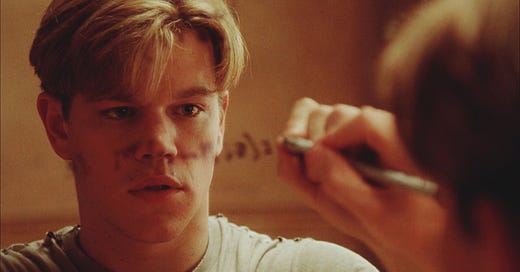What the Worst-Ever Courtroom Scene in Any American Film Tells Us About the Coming Verdict in the Rittenhouse Trial
A former criminal defense attorney takes apart the most appalling legal narrative in Hollywood history as a means of helping prepare Americans for what could be an acquittal in the Rittenhouse case.
Introduction
An early 2021 post on Reddit about Good Will Hunting—a 1997 film co-written by then-young auteurs Matt Damon and Ben Affleck—calls the flick “a movie all about how people don’t need an expensive education to succeed, written by Matt Damon while he was attending Harvard.” The redditor adds that while this component of Damon’s biography is just a “detail”, he (the redditor) nevertheless “find[s] it pretty shitty” that the A-list Hollywood celebrity would’ve been such a gratuitous hypocrite in his youth.
If only that were the worst flaw in Good Will Hunting—or the process of its creation.
As a Bostonian and a sucker for emotional manipulation, I generally enjoy Good Will Hunting, even as I recognize it to be an absolutely terrible film. As an attorney, though, I can’t forgive Damon or Affleck for writing not just one but several of the worst film sequences relating to the practice of law ever reduced to celluloid. While few people now remember these scenes—and therefore they’ve done nothing like the lasting damage to the fabric of American society that equally ludicrous, disinformation-filled treatments of America’s criminal justice system like those found in Dick Wolf’s Law & Order series have (with Wolf’s “contribution” to discourse on the rule of law being especially vile because it was explicitly crafted to demonize defense attorneys doing their best to uphold their oath to the Constitution)—they’re seared into my brain as a warning of what fraudulent portrayals of U.S. rule of law do to undermine rule of law.
In this article I painstakingly eviscerate the story of Will Hunting in an effort to shed some light on the case of Kyle Rittenhouse, the latter of which is now in the hands of a jury in Wisconsin. Whatever verdict is returned in the Rittenhouse case, it will tear still further at the fabric of American culture, particularly as it relates to the popular attitude toward (and understanding of) the law. As a lawyer who just celebrated, three weeks ago, the two-decade anniversary of my being admitted to state and federal bars, I consider it part of my professional role as an “officer of the court” (as attorneys are sometimes called) to illuminate how things really work in the courtroom. And if doing so requires taking a bad movie to task at exhaustive length to make a point, it’s a thing I’m willing to do.
In the conclusion of this essay, I turn my attention to the Rittenhouse trial in a way I hope will be illuminating to readers—whatever your current perspective on that case.





